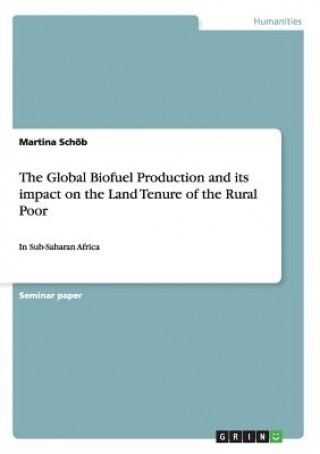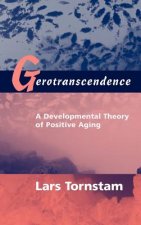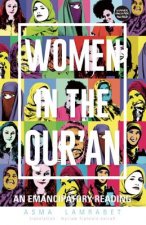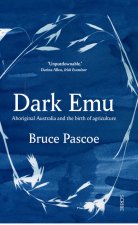
Kód: 01686180
Global Biofuel Production and its impact on the Land Tenure of the Rural Poor
Autor Martina Schöb
Seminar paper from the year 2012 in the subject Ethnology / Cultural Anthropology, printed single-sided, grade: 1, University of Luzern (ethnologisches Seminar), course: Land Grabbing, language: English, abstract: The global biofu ... celý popis
- Jazyk:
 Angličtina
Angličtina - Vazba: Brožovaná
- Počet stran: 34
Nakladatelství: Grin Publishing, 2013
- Více informací o knize

Mohlo by se vám také líbit
-

Fantasy Mandalas - Beautiful mandalas and ornamentation for colouring in, relaxation and meditation
274 Kč -

Iraq-Kuwait Dispute 1830-1994 7 Volume Hardback Set Including Boxed Maps
67873 Kč -

This is Caravaggio
352 Kč -

Purpose of Education
1149 Kč -

Rates of Phase Transformations
2458 Kč -

Die Geschichte der Vormundschaft seit der Aufklärung
1732 Kč
Dárkový poukaz: Radost zaručena
- Darujte poukaz v libovolné hodnotě a my se postaráme o zbytek.
- Poukaz se vztahuje na celou naši nabídku.
- Elektronický poukaz vytisknete z e-mailu a můžete ihned darovat.
- Platnost poukazu je 12 měsíců od data vystavení.
Více informací o knize Global Biofuel Production and its impact on the Land Tenure of the Rural Poor
Nákupem získáte 106 bodů
 Anotace knihy
Anotace knihy
Seminar paper from the year 2012 in the subject Ethnology / Cultural Anthropology, printed single-sided, grade: 1, University of Luzern (ethnologisches Seminar), course: Land Grabbing, language: English, abstract: The global biofuel production has been rapidly increasing since 2007-08 and with it the new demand for land, which has a strong focus on Africa as it has weak land rights protection. Most foreign investors, who intend to buy land for the biofuel production take advantage of the lack of proper property rights in several African countries. Therefore, many of the rural poor, who depend on land for their living, suffer from expulsion or dispossession. In summary, it can be said that the formalization of land titles only serves the poor, when secondary rights as for example for women, herders or migrants, are respected by the state or the foreign investors when allocating, buying or leasing land. In addition, during the processes of allocating, buying or leasing land, the state as well as the foreign investor should give whole local communities (not only local elites) the possibility to negotiate over the future use of the land they tilled for years. From the four land tenure reforms outlined, where land based wealth and power transfers occurs, the two best possible solutions, which serve the poor, would be the redistribution and the distribution of land. In my opinion, the preferable one of this two solutions is distribution as this solution is less conflict-prone. In the present paper two case studies are used to show how (as in the case of Ghana) local elites or foreign investors make decisions without consulting local communities or, that simply changing laws or introduce policies is not enough to protect the land rights of the affected local communities (as in the case of Mozambique). Even if local communities are compensated for loss of their land rights, many agreements between communities and investors emphasize one-off compensations rather than long-term benefit sharing, such as job creation or leasing incomes and the agreements usually involve very small payments compared to for example the value of the forest concessions acquired by investors.
 Parametry knihy
Parametry knihy
Zařazení knihy Knihy v angličtině Society & social sciences Society & culture: general Social groups
1063 Kč
- Plný název: Global Biofuel Production and its impact on the Land Tenure of the Rural Poor
- Podnázev: In Sub-Saharan Africa
- Autor: Martina Schöb
- Jazyk:
 Angličtina
Angličtina - Vazba: Brožovaná
- Počet stran: 34
- EAN: 9783656413592
- ISBN: 3656413592
- ID: 01686180
- Nakladatelství: Grin Publishing
- Hmotnost: 59 g
- Rozměry: 210 × 148 × 3 mm
- Datum vydání: 19. April 2013
Oblíbené z jiného soudku
-

Women Who Run with the Wolves
238 Kč -

Freedom Writers Diary
389 Kč -

Think Like a Monk
283 Kč -

Orientalism
323 Kč -

How Europe Underdeveloped Africa
514 Kč -

Desert Flower
276 Kč -

Why Does He Do That?
433 Kč -

Letters to a Young Muslim
303 Kč -

Eros and Mysteries of Love
423 Kč -

Puer Tea
937 Kč -

Life After Darkness
566 Kč -

Womanhood
544 Kč -

JFK - 9/11
738 Kč -

Complete Book of Pilates for Men
463 Kč -

Colloquial Yiddish
1682 Kč -

Gypsy Identities 1500-2000
1666 Kč -

Servitors of Empire
498 Kč -

Sword of No-sword
646 Kč -

Gerotranscendence
3525 Kč -

Northwest Coast Indian Art
753 Kč -

Qur'an
811 Kč -

When God Was A Woman
493 Kč -

The Mastery of Love
309 Kč -

Vintage Menswear
456 Kč -

Who Cooked the Last Supper?
427 Kč -

Women Who Run With The Wolves
433 Kč -

The Way of Men
342 Kč -

The Autobiography of Malcolm X
227 Kč -

Second Sex
284 Kč -

Goddesses in Everywoman
303 Kč -

Talking with Female Serial Killers - A chilling study of the most evil women in the world
276 Kč -

Intellectuals and Society
558 Kč -

Women in the Qur'an
480 Kč -

Erotic Bondage Book
364 Kč -

Zami
291 Kč -

Nine Years among the Indians, 1870-1879
615 Kč -

Dark Emu
410 Kč -

Childhood and Society
394 Kč -

Happy City
302 Kč -

The Male Nude
505 Kč -

The Bell Curve
464 Kč -

We Should All Be Feminists
196 Kč -

Empire of the Summer Moon
357 Kč -

Radium Girls
276 Kč -

Dance of Anger
276 Kč -

Beauty Myth
357 Kč -

Muqaddimah
540 Kč -

TROUBLEMAKER
376 Kč -

Ladies' Book of Etiquette and Manual of Politeness
382 Kč
Osobní odběr Praha, Brno a 12903 dalších
Copyright ©2008-24 nejlevnejsi-knihy.cz Všechna práva vyhrazenaSoukromíCookies



 Vrácení do měsíce
Vrácení do měsíce 571 999 099 (8-15.30h)
571 999 099 (8-15.30h)